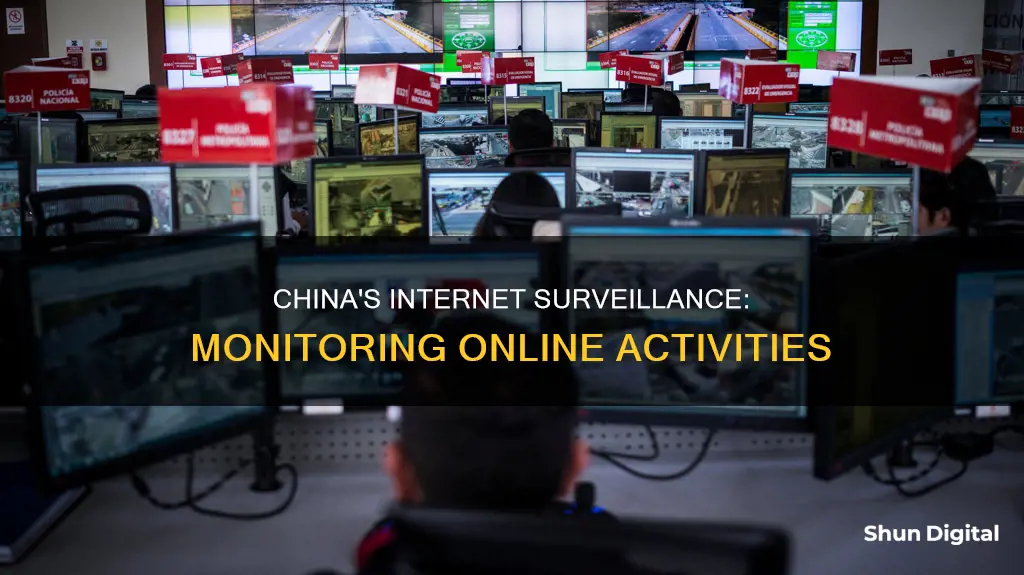
China has been dubbed the world's biggest jailer of journalists and netizens, with the government monitoring and censoring internet usage. The country's censorship operation, known as the Great Firewall of China, has been deemed sophisticated and draconian.
The Chinese government has been accused of employing tens of thousands of human monitors to screen internet content and block websites, apps, and video games. The government has also established online reporting centres that encourage citizens to report harmful information, including banned political activities and pornography.
In addition to censorship, the government has been accused of monitoring the online activity of its citizens, with internet authorities requiring some of the country's largest app providers to keep a log of user activities and supply 60-day recorded activity logs to authorities upon demand.
The implications of these actions on data privacy and freedom of speech in China are significant, with the government effectively able to police the online activity and access information of its citizens.
What You'll Learn

The 'Great Firewall of China'
The Great Firewall of China is the colloquial name for the combination of tools, services, and rules that the government of the People's Republic of China uses to block certain internet content from those within China's borders. The project, formerly known as the Golden Shield Project, started in 1998 and is still continually improving in restriction techniques through multiple methods.
The Great Firewall operates by checking transmission control protocol (TCP) packets for keywords or sensitive words. If the keywords or sensitive words appear in the TCP packets, access will be closed. If one link is closed, more links from the same machine will be blocked by the Great Firewall. The effect includes limiting access to foreign information sources, blocking foreign internet tools (e.g. Google Search, Facebook, Twitter, Wikipedia, and others) and mobile apps, and requiring foreign companies to adapt to domestic regulations.
The Great Firewall also influences the development of China's internal internet economy by giving preference to domestic companies and reducing the effectiveness of products from foreign internet companies. The techniques deployed by the Chinese government to maintain control of the Great Firewall can include modifying search results for terms and petitioning global conglomerates to remove content.
The Great Firewall is intended to shield Chinese citizens from information that the government of the People's Republic of China considers to be dangerous. However, this has created a parallel universe, with the internet inside of China being different from that in the free world, where access is open and users are free to visit any website they want.
The Great Firewall has also allowed China to develop its own major internet services, such as Tencent, Alibaba, Baidu, Renren, Youku, and Weibo. China has its own version of many foreign web properties, for example, Bilibili and Tencent Video (YouTube), Weibo (Twitter), Moments and Qzone (Facebook), WeChat (WhatsApp), Ctrip (Orbitz and others), and Zhihu (Quora).
The Great Firewall has used numerous methods to block content, including IP dropping, DNS spoofing, deep packet inspection for finding plain text signatures within the handshake to throttle protocols, and more recently active probing.
Electricity Usage Monitoring: What UK Energy Companies Can See
You may want to see also

The 'Golden Shield' project
The Golden Shield Project, also known as the National Public Security Work Informational Project, is a nationwide network-security fundamental construction project by the e-government of the People's Republic of China. The project was initiated, developed, and operated by the Ministry of Public Security (MPS) and is one of the most controversial subjects globally.
The Golden Shield Project includes a security management information system, a criminal information system, an exit and entry administration information system, a supervisor information system, and a traffic management information system, among others. It is one of twelve "golden" projects, including Golden Customs (Golden Gate), Golden Tax, Golden Finance, and Golden Auditing.
The project was initiated in 1998 and began operations in November 2003. It is a database-driven surveillance system that can access every citizen's record and link national, regional, and local security. The project also manages the Bureau of Public Information and Network Security Supervision, which is widely believed to operate a subproject called the Great Firewall of China (GFW).
The Great Firewall is a censorship and surveillance project that blocks data from foreign countries that may be unlawful in China. It blocks websites and pages by blocking IP addresses, DNS cache poisoning, analyzing and filtering URLs, packet inspection, and resetting connections.
The Golden Shield Project is a response to the Chinese government's desire to control the spread and availability of information while also benefiting from the information technology that comes with the internet to drive its economy. The project aims to strike a balance between "opening up" to the Western world and keeping its people away from Western ideology.
The project has evolved since its inception, with the liberalization of the telecommunication sector and rapid changes in technology necessitating adjustments to the initial vision. The project now focuses on content-filtering firewalls on individuals, shifting from generalized content control at the gateway level to individual surveillance of users at the edge of the network.
The Chinese government has collaborated with research institutes and technology providers, both domestic and international, to develop the necessary technology for the project. Western corporations such as Motorola, Sun Microsystems, and Cisco Systems have provided equipment and technology to support the project.
The Golden Shield Project has faced criticism and is considered a human rights violation by many in the Western world. However, some countries are adopting China's model, and China itself is exporting its technology to other countries.
Monitoring Employee Internet Usage: Company Surveillance Exposed
You may want to see also

Internet surveillance and privacy
China has the largest and most sophisticated online censorship operation in the world. The country's censorship system, known as the "Great Firewall of China", involves blocking various websites, apps, and video games, as well as employing self-censorship mechanisms and a real-name system. This censorship extends to foreign companies as well, with Google, Facebook, and other major platforms being blocked or censored within the country.
Methods of Surveillance
China employs a multitude of methods to monitor and control internet usage. These include:
- Blocking access to IP addresses: Preventing users from accessing certain websites or online services.
- DNS spoofing: Redirecting users to a different website or server than the one they intended to access.
- Analyzing and filtering URLs: Checking the addresses of websites to determine if they should be blocked.
- Packet inspection: Examining the data being transmitted over the internet to look for banned content.
- Resetting connections: Interrupting internet connections to prevent the transfer of prohibited information.
- Online reporting centers: Encouraging citizens to report "harmful" information, such as sites related to pornography, political dissent, or banned spiritual movements.
- Human monitors: Employing tens of thousands of individuals to screen internet content.
- Advanced surveillance algorithms and artificial intelligence systems: Using technology to gather, filter, and analyze vast amounts of information.
Impact on Privacy and Free Speech
The Chinese government's internet surveillance and censorship practices have significant implications for the privacy and free speech rights of its citizens. The authorities require internet companies to keep detailed logs of user activities, including their real names and a record of their online posts and activities. This information can be handed over to the government upon request, with vague and broad sanctions in place for non-compliance. As a result, Chinese citizens self-censor their online activities and avoid discussing sensitive topics to avoid punishment.
Circumvention Techniques
Despite the extensive censorship and surveillance, some individuals in China have found ways to access blocked content and protect their privacy. These include:
- Virtual Private Networks (VPNs): Tools that allow users to disguise their location and access the internet as if they were in a different country.
- Proxy servers: Servers that act as intermediaries between the user and the internet, allowing users to bypass censorship and monitoring.
- Tor: An anonymity network that hides a user's location and online activities.
- Steganography: Hiding information within innocuous-looking files or messages, such as embedding text within an image.
- Code words and analogies: Using creative language to discuss sensitive topics without triggering censorship filters.
Monitoring Power Usage: Simple Steps for Your Home
You may want to see also

Online censorship and self-censorship
China employs a vast network of provincial internet information offices to enforce its online censorship laws. The country's censorship system reaches into all aspects of online use and service provision, with the government routinely deleting any mention of topics deemed sensitive, including criticism of President Xi Jinping, the Tiananmen Square massacre, or any news that could spark mass protests.
Online Censorship
China's online censorship primarily targets content that:
- Undermines ethnic unity or the nation's policy on religions
- Spreads rumours that disrupt economic or social order
- Harms the nation's honour and interests
- Incites subversion of state power or overthrow of the government
- Promotes feudal superstitions, sexually suggestive material, gambling, violence, or murder
- Advocates terrorism or incites others to criminal activity
- Openly insults other people or distorts the truth to slander people
- Injures the reputation of state organs
The government has also escalated its efforts to reduce coverage and commentary that is critical of the regime, particularly after large anti-pollution and anti-corruption protests, which were often organized using instant messaging services, chat rooms, and text messages.
In addition, China's internet censorship laws have been criticized for their vague language, which gives Chinese authorities significant leeway in interpreting and enforcing them. For example, the term "rumour" is broadly defined as anything perceived as negative toward the government. This vagueness has raised concerns that the laws could be exploited to suppress reporting on sensitive topics such as the COVID-19 pandemic.
Self-Censorship
Self-censorship is prevalent among individuals and organizations operating in China, who fear repercussions if they irritate the government. This includes students, academics, film studios, and social media platforms.
For example, film studios have been known to tailor their movies to gain access to the lucrative Chinese market, avoiding topics that might antagonize Chinese officials. Similarly, social media platforms like Sina and QQ practice self-constraint, avoiding the publication of news that could run counter to the government's interests.
The Chinese government has also been accused of employing "an iron fist in a very thin velvet glove" when it comes to domestic internet censorship, with companies like Alibaba and Tencent becoming "bully boys of Chinese censorship" despite their lack of consent. These companies are required to keep logs of user activities and identify the real registered names of users, effectively making privacy and free speech punishable offenses.
Impact
The impact of China's online censorship and self-censorship practices is far-reaching. It severely restricts freedom of the press and expression, with Amnesty International stating that China has "the largest recorded number of imprisoned journalists and cyber-dissidents in the world."
Additionally, it has economic implications, with companies like Google and Disney making significant concessions to access the Chinese market. It also affects public opinion and discourse, with popular social media platforms like Weibo and WeChat being used to spread ideas and monitor corruption, while also being subject to heavy censorship.
Furthermore, China's online censorship and self-censorship practices have been criticized by human rights organizations and Western governments, who argue that they violate fundamental freedoms and enable the suppression of information.
Monitoring Data Usage on iPhone: Tips and Tricks
You may want to see also

The role of private companies
Private companies play a crucial role in facilitating internet censorship in China. Since commercial internet providers are heavily involved in censoring the sites they host, internet scholar Guobin Yang argues that "it may not be too much of a stretch to talk about the privatisation of internet content control". The process is simplified by the fact that several major technology entrepreneurs also hold political office. For example, Robin Li of Baidu is a member of the Chinese People's Political Consultative Conference, and Lei Jun, founder and CEO of mobile phone giant Xiaomi, is a representative of the National People's Congress.
In 2012, the Chinese government began issuing directives to China-based companies, ordering them to install hardware that would allow them to monitor internet activity, block websites, and connect directly with police servers. Businesses refusing to cooperate faced fines or suspension of internet service. This shift in tactics raised new concerns over corporate espionage, with experts arguing that such hardware could make it easier for the Chinese government to spy on international corporations.
In addition, private companies play a key role in enforcing compliance with China's complex cybersecurity regulations and internet controls. Failure to comply with relevant regulations can result in strict actions from the Cyberspace Administration of China and other regulators, including demands to make corrections, public announcements of misconduct, negative national credit recordings, closing of websites, and even revocation of business licenses. As such, private companies have a strong incentive to self-censor and ensure compliance with the government's internet censorship policies.
Furthermore, private companies are required to obtain an Internet Content Provider (ICP) license to operate in China. The ICP license allows companies to host their websites within China, resulting in faster and more reliable network speeds. However, the application process for the ICP license can be complex and time-consuming, and businesses must ensure that their operations comply with PRC laws, which strictly regulate cyberspace.
Monitoring PSU Usage: A Comprehensive Guide to Tracking Power Supply Performance
You may want to see also
Frequently asked questions
Yes, China has the largest and most sophisticated online censorship operation in the world. The government requires Internet service providers to obtain a license from the Ministry of Information Industry and maintain a complete record of customer usage for 60 days, to be surrendered upon government request.
China deploys at least 12 agencies to enforce a wide array of Internet regulations directed at service and content providers. The effort includes the policing of cybercafés, as well as government-run computers that constantly monitor for banned content.
The Great Firewall of China is a nickname given to China's censorship policy, which includes the complete blockage of various websites, apps, and video games. Methods used to block websites and pages include DNS spoofing, blocking access to IP addresses, analyzing and filtering URLs, packet inspection, and resetting connections.







